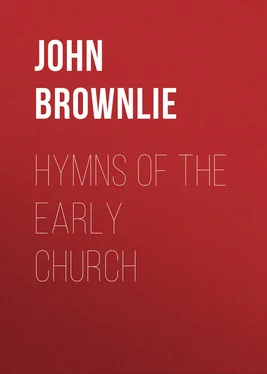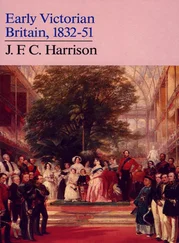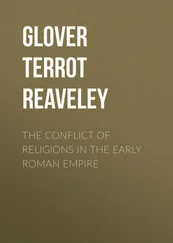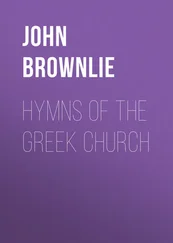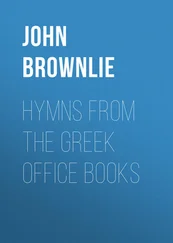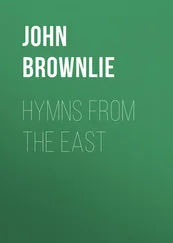John Brownlie - Hymns of the Early Church
Здесь есть возможность читать онлайн «John Brownlie - Hymns of the Early Church» — ознакомительный отрывок электронной книги совершенно бесплатно, а после прочтения отрывка купить полную версию. В некоторых случаях можно слушать аудио, скачать через торрент в формате fb2 и присутствует краткое содержание. Жанр: foreign_antique, foreign_prose, на английском языке. Описание произведения, (предисловие) а так же отзывы посетителей доступны на портале библиотеки ЛибКат.
- Название:Hymns of the Early Church
- Автор:
- Жанр:
- Год:неизвестен
- ISBN:нет данных
- Рейтинг книги:4 / 5. Голосов: 1
-
Избранное:Добавить в избранное
- Отзывы:
-
Ваша оценка:
- 80
- 1
- 2
- 3
- 4
- 5
Hymns of the Early Church: краткое содержание, описание и аннотация
Предлагаем к чтению аннотацию, описание, краткое содержание или предисловие (зависит от того, что написал сам автор книги «Hymns of the Early Church»). Если вы не нашли необходимую информацию о книге — напишите в комментариях, мы постараемся отыскать её.
Hymns of the Early Church — читать онлайн ознакомительный отрывок
Ниже представлен текст книги, разбитый по страницам. Система сохранения места последней прочитанной страницы, позволяет с удобством читать онлайн бесплатно книгу «Hymns of the Early Church», без необходимости каждый раз заново искать на чём Вы остановились. Поставьте закладку, и сможете в любой момент перейти на страницу, на которой закончили чтение.
Интервал:
Закладка:
John Brownlie
Hymns of the Early Church / being translations from the poetry of the Latin church, arranged in the order of the Christian year
This volume is intended for hours of devotion, and the vast storehouse of sacred poetry of the Latin Church has been put under tribute to supply the material.
If an apology should be required for the book, it may perhaps be enough to say that, while south of the Tweed Latin hymnody has had considerable attention paid to it, the subject has hitherto been all but neglected in Scotland. There may be reasons for this – we believe there are; but with these we have nothing to do here. The fact remains that, while Anglicans can point to a long list of names worthily associated with this department of Christian literature, including such well-known hymnologists as Trench, Neale, and Newman, we in Scotland have only two: Robert Campbell, author of the “St. Andrews Hymnal,” and Dr. Hamilton M‘Gill, author of “Songs of the Christian Creed and Life,” with the addition of Dr. Horatius Bonar, who, besides reflecting the spirit of the poetry of the Early Church in many of his own hymns, has left us also a few skilful renderings of the original. The present volume is, we believe, the first of its kind produced by Scotsmen and Presbyterians.
In making a selection, the translator has experienced no difficulty in regard to the quantity and quality of material at hand; indeed, he has laboured under an embarrassment of riches. But the choice has been made from the best, and care has been taken to use only those hymns that might be acceptable in point of doctrine to the most fastidious.
It has been the aim of the translator to give the idea and spirit of the Latin verses, and except in a very few instances absolute faithfulness to the original has been observed, with as much literalness as it is possible to give to work of this sort.
As a rule the original measures have been retained, and only in a few pieces, where change seemed desirable, have different measures been adopted.
For the original text, the following collections have been used: —
Daniel, H. A. Thesaurus Hymnologicus. 5 vols. Halle and Leipzig, 1841-56.
Mone, F. J. Lateinische Hymnen des Mittelalters. 3 vols. Freiburg, 1853-55.
Wrangham, D. S. “The Liturgical Poetry of Adam St. Victor.” 3 vols. London, 1881.
Newman, J. H. Hymni Ecclesiæ. Oxford and London, 1865.
Neale, J. M. Hymni Ecclesiæ. London, 1851.
Trench, R. C. “Sacred Latin Poetry.” London, 1886.
The translator desires to give expression to his sense of indebtedness to Dr. M‘Crie, whose share in this work is by no means confined to the Introduction and Notes. It was at his instigation that the task was at first undertaken, and his help and co-operation as the work of rendering progressed, were ungrudgingly given.
It will be cause for thankfulness to the translator if the work of some of the happiest hours of his life should meet with the appreciation and approbation of his fellow-countrymen, and awaken their interest in a department of devotional literature which has been too long neglected.
Portpatrick,
November 1895.
The Latin poetry of the Christian Church presents a tempting field for the exercise of scholarship and research. The relation in which it stands on the one hand to the classic poetry of Greece and Italy, and on the other to the Liturgies of the Eastern Church, the placing of accent in the room of quantity, and the rise and growth of rhyme – these and such-like matters will always prove attractive to experts and specialists. They are, however, quite beyond the scope of this brief paper. Those who wish to make an exhaustive study of a subject which has many sides and a copious literature, would do well to betake themselves to such standard works as are noted below. 1 1 Mone’s Lateinische Hymnen des Mittelalters ; Daniel’s Thesaurus Hymnologicus ; Tischer’s Kirchenlieder-Lexicon ; Trench’s “Sacred Latin Poetry;” Neale’s “Latin Hymns and Sequences,” and “Essays on Liturgiology and Church History;” Duffield’s “Latin Hymn-Writers and their Hymns;” Roundell Palmer’s “Hymns: their History and Development in the Greek and Latin Churches, Germany, and Great Britain;” Julian’s “Dictionary of Hymnology.”
The general reader may find something to profit and to interest him in the following general survey.
The title placed on our Saviour’s cross, setting forth His accusation – “Jesus of Nazareth, the King of the Jews,” was written in three languages – in Hebrew and in Greek and in Latin. That collocation of languages gives the order in which the hymnody of the Church developed.
Hebrew hymnody is contained for the most part in the Hebrew Psalter; for the distinction between psalms and hymns is not one that admits of being applied to all Hebrew poetry. Our Lord and His disciples, as they went out to the Mount of Olives after the institution and first observance of the Supper Sacrament, sang a portion of the Great Hallel, which consists of Psalms cxiii. to cxviii. inclusive. Their doing so is described in the New Testament as singing “an hymn,” just as the singing of Paul and Silas in the Philippian prison is said to be singing hymns unto God. 2 2 Matt. xxvi. 30, ὑμνήσαντες; Acts xvi. 25, ὕμνουν, A. V. – “Sang praises unto God;” R. V. – “Were … singing hymns unto God.”
In the Eastern or Greek Church hymnody was in both private and public use from earliest times. The oft-quoted letter of the younger Pliny, written soon after his arrival as Proconsul in the provinces of Bithynia and Pontus, which took place in A.D. 110, informs the Emperor that it was the practice of the Christians to meet together on a certain day and sing antiphonally ( secum invicem ) a hymn to Christ as their God; while the “Apostolical Constitutions,” which take us back to the life of the Church in the second or third centuries, enjoin the use of morning and evening hymns of praise for God’s beneficence by Christ. From the ample stores of Oriental hymnology there have come into modern collections many of their gems, thanks to the scholarship and versifying skill of Dr. Neale, Keble, and Canon Bright. To the first named we are indebted for such well-known renderings of Greek sacred pieces as “Fierce was the wild billow,” and, “The day is past and over,” as also for “Art thou weary, art thou languid?” From the author of the “Christian Year” we have a beautiful English rendering of a first or second century Greek hymn, preserved by Basil, “Hail, gladdening Light, of His pure glory poured;” and from Canon Bright we have the vesper or “lamplighting hymn,” with its opening invocation, “Light of gladness, Beam Divine.”
The Western Church came under Eastern influence in the matter of hymn composition in the fourth century. The first to compose hymns in Latin verse was Hilary of Poitiers. This theologian was banished to Phrygia by the Emperor Constantius, because of his defence of the Nicene Creed from the attacks of the Arian party. During the bishop’s exile, his daughter, Abra, wrote to inform him that she had been sought in marriage, although only in her thirteenth year. This drew forth a reply in which the father left the decision to her own choice, indicating at the same time a personal preference for continued virginity. Enclosed in the communication were a hymnus matutinus and a hymnus vesperinus . The morning hymn, beginning Lucis largitor splendida , is still extant, and has been styled “the oldest authentic original Latin song of praise to Christ as God.” It is, however, more than doubtful if the one for evening use survives; for the hymn, Ad cœli clara non sum dignus sidera , given in the Benedictine edition of Hilary’s works, belongs to the sixth or seventh century, and is probably of Irish authorship.
Читать дальшеИнтервал:
Закладка:
Похожие книги на «Hymns of the Early Church»
Представляем Вашему вниманию похожие книги на «Hymns of the Early Church» списком для выбора. Мы отобрали схожую по названию и смыслу литературу в надежде предоставить читателям больше вариантов отыскать новые, интересные, ещё непрочитанные произведения.
Обсуждение, отзывы о книге «Hymns of the Early Church» и просто собственные мнения читателей. Оставьте ваши комментарии, напишите, что Вы думаете о произведении, его смысле или главных героях. Укажите что конкретно понравилось, а что нет, и почему Вы так считаете.
